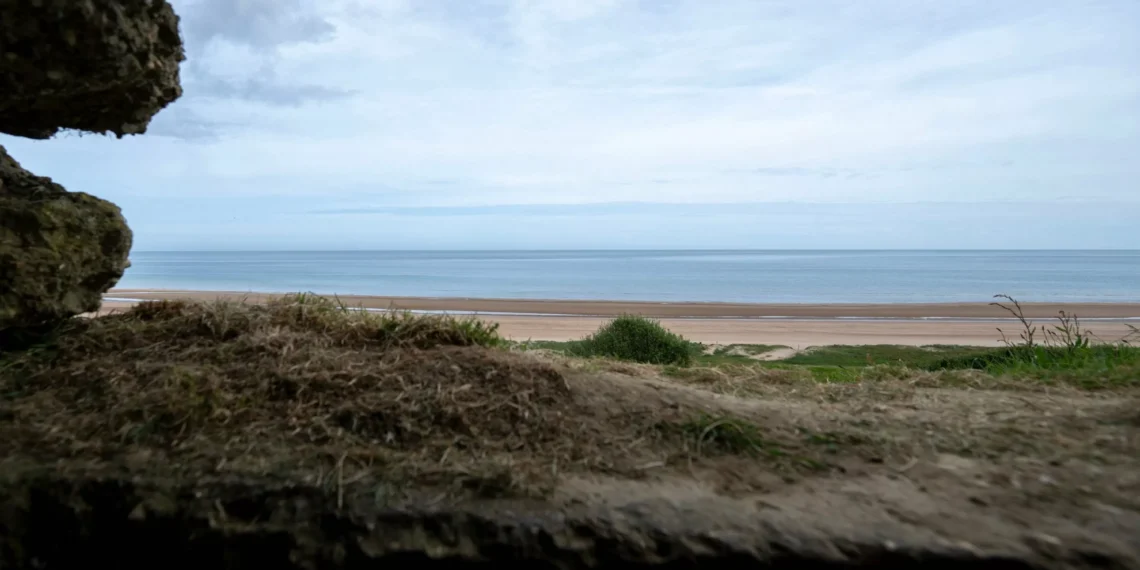As France prepares to mark 80 years since Allied forces landed on the beaches of Normandy, the country is facing a new threat – rising sea levels linked to climate change. This threat not only endangers the historic coastline, but also the lives and livelihoods of the people who call it home.
The D-Day landings, known as Operation Overlord, are a significant event in world history. On June 6, 1944, thousands of Allied troops stormed the beaches of Normandy, marking the beginning of the liberation of Western Europe from Nazi rule. It was a moment that brought together countries from around the world in a united effort to defeat tyranny and restore peace. Now, as we prepare to commemorate this pivotal moment, we must also acknowledge the pressing issue of climate change and its impact on this symbolic coastline.
Since the D-Day landings, the Normandy coastline has remained largely unchanged. Its beautiful beaches, stunning cliffs, and charming towns have served as a reminder of the bravery and sacrifice of those who fought for freedom. However, climate change is threatening to drastically change this landscape. The rising sea levels pose a serious threat to the coastline, putting it at risk of erosion and flooding.
According to a report by the Intergovernmental Panel on Climate Change, sea levels are projected to rise by at least one meter by the end of this century. This may seem like a relatively small increase, but it can have a significant impact on coastal regions like Normandy. The erosion caused by rising sea levels can lead to the loss of important landmarks, such as the Pointe du Hoc cliffs, where American soldiers scaled the steep cliffs to take control from German forces during the D-Day landings.
Furthermore, flooding caused by sea level rise can have devastating effects on the local communities. Towns and villages along the Normandy coastline, including the iconic seaside town of Arromanches, could be washed away by intense storms and high tides, displacing thousands of residents and damaging infrastructure. This would not only harm the economy of these communities, but also the cultural and historical significance that makes them so special.
The threat of rising sea levels is not limited to the Normandy coastline, as it is a global issue that affects every country. Yet, as we prepare to remember the D-Day landings and the unity and strength they symbolize, we must take action to protect the coastline that served as a turning point in World War II. The good news is that there is still time to make a difference and mitigate the effects of climate change on the Normandy coastline.
The French government has already taken steps to address this issue by investing in adaptation and mitigation measures, such as seawalls and beach nourishment, to protect the coastline. However, more needs to be done, and this responsibility falls on all of us. We must all make efforts to reduce our carbon footprint and make sustainable choices in our daily lives. This includes using renewable energy, reducing our consumption of single-use plastic, and supporting businesses that prioritize eco-friendly practices.
As we reflect on the bravery and heroism of the soldiers who fought on the beaches of Normandy 80 years ago, we must also honor their legacy by taking action to protect their legacy. Let us not wait for the damage to become irreversible before we act. Every small step towards a more sustainable future can make a big difference in preserving the Normandy coastline for future generations.
In addition, we can also support organizations and initiatives that work towards preserving and protecting the coastline. By coming together as a global community, we can make a significant impact in the fight against climate change and safeguard the historic Normandy coastline.
As we prepare to commemorate the 80th anniversary of the D-Day landings, let us remember the importance of unity and working together towards a common goal. This is not just a French issue, but a global one, and it is up to all of us to take action. Let us honor the bravery and sacrifice of those who fought for freedom by preserving the coastline that played a vital role in this historic moment. The Normandy coastline can continue to serve as a symbol of hope and strength for generations to come, but only if we take action now to protect it.







